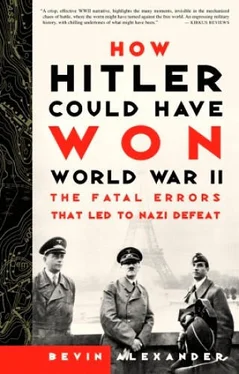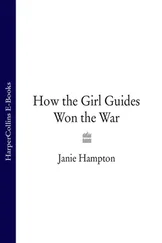Meanwhile Rommel’s supply situation had improved vastly because Hitler had transferred a Luftwaffe air corps to Sicily and Italy, and it beat down British air and sea domination over the sea route to Libya. On January 5, 1942, an Italian convoy reached Tripoli with fifty-five tanks and a number of antitank guns. Counting repaired armor, Rommel now had 111 German and 89 Italian tanks on January 20. The British 1st Armored Division had 150, all manned by inexperienced crews.
At once Rommel resolved on a counteroffensive. To preserve secrecy, he kept his plans from both the German and Italian high commands. He lulled the British into complacency by forbidding all air reconnaissance, camouflaging his tanks to look like trucks, and massing his forces by short night marches.
When he struck, therefore, on the night of January 20–21, 1942, he achieved absolute surprise. Rommel sent a battle group of 90th Light and some tanks northward along the Via Balbia, while Africa Corps advanced about forty miles inland, along the Wadi el Faregh. Rommel hoped to block the retreat of the British. But the going was so hard through the sand dunes that the enemy had time to escape, concentrating east of Agedabia. Africa Corps ran out of fuel, but Rommel took personal command of the 90th Light battle group and rushed into Agedabia, seized the town on January 22, and continued on northward on the Via Balbia, throwing British supply columns into confusion.
Rommel now tried to block the retreat of 1st Armored Division, but the bulk of it escaped, although Africa Corps was able to surround and destroy one combat group with seventy tanks near Saunnu, forty miles northeast of Agedabia. The remaining British tanks broke for Msus, forty miles north. In one of the most extraordinary chases of the war, the panzers pursued the British armor, and wrecked more than half of the remaining tanks.
Rommel now feinted with Africa Corps toward El Mechili, eighty miles northeast of Msus across the chord of the Cyrenaican bulge. Since Rommel had used this route in his first offensive in April 1941, Ritchie took the bait and concentrated all his armor to meet it. Instead, Rommel rushed 90th Light along the coast to Benghazi, where it captured mountains of supplies and 1,000 men from the 4th Indian Division. The victory brought promotion to colonel general from Hitler, but no additional troops.
The men of the Panzer Group were at the end of their strength. When Ritchie withdrew to Gazala, only forty miles west of Tobruk, and began building a new defensive line, all the Germans and Italians could do was to come up on the line on February 6, 1942.
Once more, Rommel had gained much with little. At Gazala, he was positioned to resume the attack as soon as he could rebuild his army.
12 NO CHANGE IN STRATEGY

WITH THE ENTRY OF THE UNITED STATES INTO THE WAR, A WHOLLY NEW STRATEGIC challenge faced Germany. The potential power of America was immense. But its application lay in the future. Hitler had to decide between two alternatives: Should he continue the attack on the Soviet Union, or should he go on the defensive there and concentrate on keeping American and British forces away from the continent of Europe?
For Admiral Erich Raeder, the choice was easy. On February 13, 1942, he proposed that Germany’s primary military tasks should be for Rommel to drive through Egypt to the Middle East, while the army in Russia did only two things: capture Murmansk and close that ice-free port to Allied convoys, and drive into the Caucasus to seize Soviet oil wells. After that the way would be clear to cross into Iran, close off that supply line to Russia, and join up with Rommel. Meanwhile, German war production should be shifted over predominately to the navy and air force to build more submarines and other vessels and aircraft to interdict the flow of supplies from America.
Two days later, an airplane brought Rommel to Hitler’s headquarters at Rastenburg in East Prussia. Rommel pressed hard for more forces, three more divisions, to double the German troops he possessed in North Africa. With these, he said, he could smash the British, capture Egypt, drive the Royal Navy out of the Mediterranean, and press to the oil fields of Iraq and Iran.
Rommel’s proposals strengthened Raeder’s argument for a sea change in German strategy—away from Russia and, at long last, aimed at the British and their new American allies. Despite the terrible losses suffered in the Russian campaign—more than a million men had been killed, wounded, or captured in eight months of fighting, one-third of the entire German army in the Soviet Union—Raeder’s and Rommel’s proposals still could have saved the war for Germany.
Much would be gained if North Africa and the Middle East were finally captured, the remaining strength of the German army largely preserved, and an all-out campaign undertaken to stop the flow of supplies across the Atlantic. Because of Japan’s advances, it would be a year, at least, before the United States could exert any substantial strength beyond the Pacific, and more time would go by before it could build enough ships, landing craft, air fleets, and armies to invade western Europe. When the time came, Germany might be much stronger and much more able to resist.
But at this moment Adolf Hitler made the final decision that closed off any hope of reaching a negotiated settlement. He refused to consider Raeder’s and Rommel’s proposals. He made it clear that he wanted first to destroy the Red Army and eliminate its sources of strength. After that, other courses might be followed. But for now, the Ostheer— or army in the east—was to receive priority, and the German economy was to be directed at rearming this army, not at building a great U-boat fleet and air force, and not at reinforcing Rommel.
Consequently, as the year 1942 opened, Hitler continued to avert his strategic gaze from the west and maintained his fixation on destroying the Soviet Union. The British and the Americans didn’t know it yet, but they had been granted a long reprieve and a great opportunity to build their power.
The defeat at Pearl Harbor had so shocked and angered the American people, however, that it was an open question whether they would turn on Germany before they had smashed the Land of the Rising Sun. Prime Minister Churchill, fearful they might choose Japan over Germany as the major enemy, traveled to Washington only days after the Japanese attack.
With Churchill on the battleship Duke of York was a large entourage to work out a joint strategy with the United States. These talks, code-named Arcadia, led to reaffirmation of the “Germany first” policy established in the British-American ABC-1 meetings in the winter past and to the formation of the Combined Chiefs of Staff Committee (CCSC), a joint authority to direct the war made up of the heads of the armed services of both countries.
But agreement on a broad plan to defeat Germany before turning full American power on Japan did not mean that the British and the American leaders saw eye to eye. It quickly became clear that the Americans—led by General George C. Marshall, U.S. Army chief of staff and principal military adviser to the president—wanted to strike directly at German power by crossing the English Channel, challenging the Germans in a stand-up fight on the beaches, then driving them back into Germany and destroying their army. The British, with far fewer men and much leaner resources, preferred an indirect approach through the Mediterranean, which Churchill characterized as “the soft underbelly of the Axis.”
There were arguments either way. A straight shot across the Channel would be a shorter route to the vitals of Germany. But the British believed that the long way around might be the shortest way home. Not only would a direct attack, being the most obvious, be the most heavily contested, and therefore the most expensive in men and materials, but it would also drive the Germans back on their reserves and supplies rather than cutting them off from their means to resist.
Читать дальше



![Джонатан Димблби - Barbarossa - How Hitler Lost the War [calibre]](/books/385421/dzhonatan-dimblbi-barbarossa-how-hitler-lost-the-w-thumb.webp)









